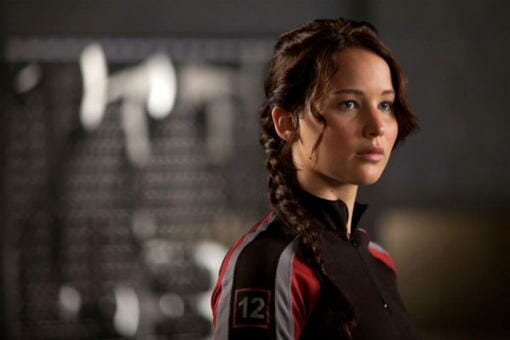By Tiffiny Whitney · March 26, 2012

For as much as Hollywood can be condemned for its tendency to greenlight unnecessary sequels and disaster movies where the plots are thinner than tissue paper, every once in a while they get it right. The chances go up when they adapt a best-selling book with an already-built-in audience. Masterfully crafted, The Hunger Games is a tale reminiscent of ancient gladiatorial Rome, meets the legend of the Minotaur, meets Lord of the Flies, meets The Truman Show. And though that seems a lot, the mishmash of each of these elements creates a deliciously simple, yet complicated plot that explores the very depths of what humanity is capable of on both the best and worst ends of the spectrum.
The story follows 16-year-old Katniss Everdeen (Academy Award-nominated Jennifer Lawrence), a strong-willed and resourceful girl growing up sometime in a not-so-distant future. Seventy-four years prior, a huge portion of the population, in protest of their poor living conditions, rose up against the wealthy. As the rebellions were quashed, the ruling body instituted the “hunger games.” An annual “punishment” in remembrance of the rebellion, the event is a televised battle to the death in which each of the rebelling “districts” must offer up both a boy and a girl between the ages of 12 to 18. When Katniss’s just barely-old-enough sister is selected at random to be subjected to the games, Katniss volunteers in her place. Full of huge names such as Elizabeth Banks, Stanley Tucci, and Woody Harrelson, what follows is an exciting, intense, and extremely disturbing exploration into just how upsetting—and compelling–human nature can really be.
I honestly cannot say enough wonderful things about The Hunger Games. While I can’t take the tact of evaluating it as a fan of the books (because I’ve never read them), I can at least say that, from a fresh perspective, one does not need to be a fan of its literary predecessor to love this film. Though it starts a little slowly, with about the first hour of the film serving as almost pure exposition, the writers of The Hunger Games made sure to do everything possible to keep their audience’s attention at this critical entry point by focusing on the creation of great characters. Though a lot can be attributed to the fact that the characters were pulled from the original Suzanne Collins novel, there is quite a talent to capturing the essence of and staying true to an author’s original intents concerning the psychology of each person in the plot. Especially in the beginning of the film, a lot of attention is placed on not only Katniss’s skill as an archer and hunter, but also on her strong devotion to her family (particularly her sister). This attention lays groundwork for the rest of the film in propelling it forward logically to where the audience can clearly see and understand not only when Katniss is at her most vulnerable and at her strongest, but also what motivates her as a character. Though strong on the outside (and obviously on the inside as well), Katniss harbors an extremely deep emotional side that projects humanity into an all-too-familiar dystopian future. Though it is generally a pretty big no-no in the screenwriting world to make your first act more than thirty minutes, The Hunger Games is one of those few films that can bend this rule pretty liberally and still get away with it—and a huge portion of it, despite the film’s intriguing premise, rests squarely on its masterful characterization.
With all the credit that can be given to the makers of the film, especially for the writing and direction, the acting was perhaps one of the most killer parts of the movie. As previously mentioned, there are quite a few really big names that litter the screen. From younger actors like Josh Hutcherson (Peeta Mellark in the film, though you may know him from films like Journey 2: The Mysterious Island), to industry vets like Stanley Tucci and Woody Harrelson, The Hunger Games seems to commit each and every single member of its cast to some extremely stellar performances. Even musician Lenny Kravitz, who plays a designer name Cinna, really delivers in an extremely surprising and emotional performance (and, oddly enough, his daughter appeared in X-Men: First Class with Jennifer Lawrence back in 2011). The most captivating performance, however, was brought in by the Academy Award-nominated Lawrence, who may very well be getting another similar nomination for this role. Displaying a capacity to be both a strong and almost cold character for almost the entire first half of the film, she subjects herself to some extremely intense emotion as her character is exposed to situations that generally only combat soldiers see, let alone children. Superb is about the only adjective that can be applied to her performance and the development and maturity she shows.
Though The Hunger Games doesn’t quite play by all the “rules” of screenwriting, it does adhere to the most cardinal of all—keeping your audience interested. Though a bit slow at first, it turns into a non-stop roller coaster of intense action and emotion that runs the audience through the gamut of feeling. And though disturbing in an almost foreboding nature about the future of what we term as reality television, The Hunger Games is certainly an intriguing film that is well worth the almost two and a half hours of sitting time. It succeeds in entertaining, but also in making its audience think about the implications of our actions and society. It changes you, and makes you smarter all at once. And a movie that can do that certainly satisfies my appetite at the theater.